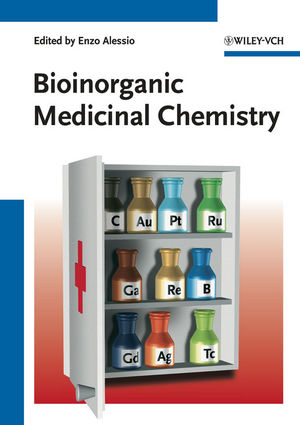Bioinorganic Medicinal ChemistryISBN: 978-3-527-32631-0
Hardcover
440 pages
March 2011
 |
||||||
MEDICINAL INORGANIC CHEMISTRY: STATE OF THE ART, NEW TRENDS, AND A VISION OF THE FUTURE
Introduction
Antimicrobial Agents
Antiviral Agents
Systemic and Metabolic Diseases Including Inflammation
Metal Chelating Agents
Antiarthritic Drugs and Inflammation
Bipolar Disorder
Anticancer Agents
Small Molecule Delivery and Control
Diagnostic Agents
Veterinary Medicinal Inorganic Chemistry
Conclusions and Vision
TARGETING STRATEGIES FOR METAL-BASED THERAPEUTICS
Introduction
Physiological Targeting
Molecular Targeting
Immunological Targeting
Concluding Remarks
CURRENT STATUS AND MECHANISM OF ACTION OF PLATINUM-BASED ANTICANCER DRUGS
Introduction
Mechanism of Action of Cisplatin
Limitations of Current Platinum-Based Compounds: New Strategies
Novel Concepts in the Development of Platinum Antitumor Drugs
Concluding Remarks
NEW TRENDS AND FUTURE DEVELOPMENTS OF PLATINUM-BASED ANTITUMOR DRUGS
Introduction
Mechanisms of Action and Resistance
Monofunctional Platinum(II) Complexes
Trans-Platinum(II) Complexes
Multinuclear Platinum(II) C omplexes
Platinum(IV) Complexes
Delivery of Platinum Drugs
Concluding Remarks and Future Perspectives
RUTHENIUM AND OTHER NON-PLATINUM ANTICANCER COMPOUNDS
Introduction
Ruthenium Anticancer Compounds
From Gallium Nitrate to Oral Gallium Complexes
Titanium Anticancer Compounds
Ferrocene-Derived Anticancer Agents
The Main Group Organometallics Spirogermanium and Germanium-132
Arsenic in Cancer Chemotherapy
Overcoming the Resistance of Tumors to Anticancer Agents by Rare Earth Element Compounds
Conclusions
THE CHALLENGE OF ESTABLISHING RELIABLE SCREENING TESTS FOR SELECTING ANTICANCER METAL COMPOUNDS
Introduction
Tumor Cell Growth Inhibition and Cell Death Screening Assays
Metal-Based Anticancer Compounds and Gene Expression Microarray Technologies
Metal-Based Anticancer Compounds and the Proteomic Approach
Concluding Remarks
GOLD-BASED THERAPEUTIC AGENTS: A NEW PERSPECTIVE
Introduction
Biological Chemistry of Gold
Gold Antiarthritic Drugs
Gold Complexes as Anticancer Agents
Gold Complexes as Antiparasitic Agents
Concluding Remarks
MRI CONTRAST AGENTS: STATE OF THE ART AND NEW TRENDS
Introduction
T1 Agents
T2-Susceptibility Agents
CEST Agents
Concluding Remarks
METAL-BASED RADIOPHARMACEUTICALS
Introduction
Selected Examples: Therapeutic Radiopharmaceuticals
Diagnostic Metal-Based Radiopharmaceuticals
Perspectives and Conclusion
BORON AND GADOLINIUM IN THE NEUTRON CAPTURE THERAPY OF CANCER
Introduction
Boron Neutron Capture Therapy
Role of Medicinal Inorganic Chemistry in BNCT
Gadolinium Neutron Capture Therapy
Conclusions and Future Outlook
ESSENTIAL METAL RELATED METABOLIC DISORDERS
Introduction: What is Essentiality?
Iron Metabolic Diseases: Acquired and Genetic
Copper Metabolic Diseases
Zinc Metabolic Diseases
Diseases Related to Imbalances in Electrolytic Metabolism: P, the Alkali Metals, and the Alkaline Earths
Metabolism of Other Trace Elements
Conclusions
METAL COMPOUNDS AS ENZYME INHIBITORS
Introduction
Kinase Inhibitors
Proteasome Inhibitors
Carbonic Anhydrase Inhibitors (CAIs)
Cyclooxygenase Inhibitors
Acetylcholinesterase Inhibitors
Protein Phosphatase Inhibitors
Trypsin and Thrombin Inhibitors
Cysteine Protease Inhibitors and Glutathione Transferase Inhibitors
HIV-1 Reverse Transcriptase and Protease Inhibitors
Telomerase Inhibitors
Zinc Finger Protein Inhibitors
CXCR4 Inhibitors
Xanthine Oxidase Inhibitors
Miscellaneous Protein Inhibitors and Conclusions
BIOMEDICAL APPLICATIONS OF METAL-CONTAINING LUMINOPHORES
Introduction: Luminescence in Diagnostics and Imaging
Transition-Metal Containing Luminescent Agents
Lanthanide-Based Luminophores
Nanoparticle-Based Luninophores
Conclusions and Perspectives
Introduction
Antimicrobial Agents
Antiviral Agents
Systemic and Metabolic Diseases Including Inflammation
Metal Chelating Agents
Antiarthritic Drugs and Inflammation
Bipolar Disorder
Anticancer Agents
Small Molecule Delivery and Control
Diagnostic Agents
Veterinary Medicinal Inorganic Chemistry
Conclusions and Vision
TARGETING STRATEGIES FOR METAL-BASED THERAPEUTICS
Introduction
Physiological Targeting
Molecular Targeting
Immunological Targeting
Concluding Remarks
CURRENT STATUS AND MECHANISM OF ACTION OF PLATINUM-BASED ANTICANCER DRUGS
Introduction
Mechanism of Action of Cisplatin
Limitations of Current Platinum-Based Compounds: New Strategies
Novel Concepts in the Development of Platinum Antitumor Drugs
Concluding Remarks
NEW TRENDS AND FUTURE DEVELOPMENTS OF PLATINUM-BASED ANTITUMOR DRUGS
Introduction
Mechanisms of Action and Resistance
Monofunctional Platinum(II) Complexes
Trans-Platinum(II) Complexes
Multinuclear Platinum(II) C omplexes
Platinum(IV) Complexes
Delivery of Platinum Drugs
Concluding Remarks and Future Perspectives
RUTHENIUM AND OTHER NON-PLATINUM ANTICANCER COMPOUNDS
Introduction
Ruthenium Anticancer Compounds
From Gallium Nitrate to Oral Gallium Complexes
Titanium Anticancer Compounds
Ferrocene-Derived Anticancer Agents
The Main Group Organometallics Spirogermanium and Germanium-132
Arsenic in Cancer Chemotherapy
Overcoming the Resistance of Tumors to Anticancer Agents by Rare Earth Element Compounds
Conclusions
THE CHALLENGE OF ESTABLISHING RELIABLE SCREENING TESTS FOR SELECTING ANTICANCER METAL COMPOUNDS
Introduction
Tumor Cell Growth Inhibition and Cell Death Screening Assays
Metal-Based Anticancer Compounds and Gene Expression Microarray Technologies
Metal-Based Anticancer Compounds and the Proteomic Approach
Concluding Remarks
GOLD-BASED THERAPEUTIC AGENTS: A NEW PERSPECTIVE
Introduction
Biological Chemistry of Gold
Gold Antiarthritic Drugs
Gold Complexes as Anticancer Agents
Gold Complexes as Antiparasitic Agents
Concluding Remarks
MRI CONTRAST AGENTS: STATE OF THE ART AND NEW TRENDS
Introduction
T1 Agents
T2-Susceptibility Agents
CEST Agents
Concluding Remarks
METAL-BASED RADIOPHARMACEUTICALS
Introduction
Selected Examples: Therapeutic Radiopharmaceuticals
Diagnostic Metal-Based Radiopharmaceuticals
Perspectives and Conclusion
BORON AND GADOLINIUM IN THE NEUTRON CAPTURE THERAPY OF CANCER
Introduction
Boron Neutron Capture Therapy
Role of Medicinal Inorganic Chemistry in BNCT
Gadolinium Neutron Capture Therapy
Conclusions and Future Outlook
ESSENTIAL METAL RELATED METABOLIC DISORDERS
Introduction: What is Essentiality?
Iron Metabolic Diseases: Acquired and Genetic
Copper Metabolic Diseases
Zinc Metabolic Diseases
Diseases Related to Imbalances in Electrolytic Metabolism: P, the Alkali Metals, and the Alkaline Earths
Metabolism of Other Trace Elements
Conclusions
METAL COMPOUNDS AS ENZYME INHIBITORS
Introduction
Kinase Inhibitors
Proteasome Inhibitors
Carbonic Anhydrase Inhibitors (CAIs)
Cyclooxygenase Inhibitors
Acetylcholinesterase Inhibitors
Protein Phosphatase Inhibitors
Trypsin and Thrombin Inhibitors
Cysteine Protease Inhibitors and Glutathione Transferase Inhibitors
HIV-1 Reverse Transcriptase and Protease Inhibitors
Telomerase Inhibitors
Zinc Finger Protein Inhibitors
CXCR4 Inhibitors
Xanthine Oxidase Inhibitors
Miscellaneous Protein Inhibitors and Conclusions
BIOMEDICAL APPLICATIONS OF METAL-CONTAINING LUMINOPHORES
Introduction: Luminescence in Diagnostics and Imaging
Transition-Metal Containing Luminescent Agents
Lanthanide-Based Luminophores
Nanoparticle-Based Luninophores
Conclusions and Perspectives



